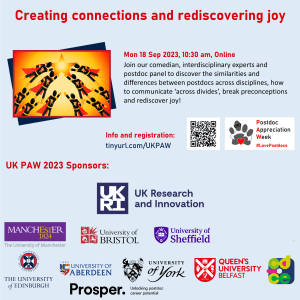Your development matters!
Focus on
Prosper: Explore
Prosper is a portal filled to the brim with great resources for postdocs, managers of researchers and institutions to aid researcher career development.
In the “Explore” section, you can find resources and tools to help you develop your self-awareness and identify your career goals, including articles, assessments, and exercises.
Action for you: Set aside time to Explore and identify 1-2 resources that can help you become clearer about your next career step.
In the next bulletin, we will focus on “Act”
Upcoming workshops
Places are now available on the following workshops:
- 05 February 11:00-12:00- Drop in Q&A on the Research Project Life Cycle
- 05 February 10:00-12:30- Bristol Clear 1:1s
- 06 February 14:00-15:00- Introduction to Post-Award research finance – monitoring and budgeting
- 08 February 10:30-12:30- Advanced influencing policy: How to engage with policymakers and the policy-making process
- 09 February 09:30-12:30- Engaged Research: why and how to embed Public Engagement in your research (in person)
- 13 February 09:30-13:00- Narrative CV writing workshop (in person)
- 20 February 11:00-12:00- An introduction to Public Engagement with Research: involving the public in your research
- 26 February 09:30-12:00- Discovering Career Support for Researchers at Bristol
- 27 February 10:00-11:30- Intro to Research Funding [Sci+Eng]
- 27 February 09:30-12:00- Managing Research Teams (in person)
- 28 February 14:00-15:00- Intro to Research Funding [Health and Life Science]
- 28 February 09:30-13:00- Healthy and Sustainable Productivity Habits- Part 1
- 29 February 09:30-12:30- Working Towards a Lectureship
To book, please sign in to Develop now and search the catalogue for these course titles. To book a place when registration has closed, please email sd-course@bristol.ac.uk
To see a full list of Bristol Clear and Research in Practice workshops, please see our webpage.
Research-related events and initiatives
Bristol Women’s Mentoring Network 2024 – Call for Mentees and Mentors
Supporting academic and professional services colleagues, we are launching a new round for 2024. We are inviting:
- New mentees (academic or professional services women or individuals who identify as female, grades J, K, L and M) to apply
- New mentors (anyone from academic, professional services & University of Bristol Alumni, grades K, L, M & X).
- Returning mentors can express their interest by emailing uob-mentoring@bristol.ac.uk.
Please visit Bristol Women’s Mentoring Network for more details. Please circulate to any colleagues who may be interested.
Sign up to information sessions on Develop
Community Fellowship Opportunity – From the Personal to the Planetary: Interaction, Activism and Futures
The Brigstow Institute and Cabot Institute for the Environment are collaborating on an initiative called From the Personal to the Planetary: Interaction, Activism and Futures. The initiative seeks to activate a broad range of people and stakeholders in considering climate change and responding to the climate emergency.
- Deadline: 10:00am, 19th February 2024
- Funding available: £5,000 per fellowship (VAT inclusive)
- Number of fellowships available: a total of eight P2P Community Fellowships positions (four academic fellowships drawn from the University of Bristol only, four fellowships for those beyond the university)
- Timescale of fellowships: fellowships begin June 2024 for 10 months with some flexibility.
Find out more about the fellowships and application process: https://www.bristol.ac.uk/brigstow/funding/p2pfellowships/
Invitation to attend Arts, Law and Social Sciences health & social care research networking event on Tuesday 27 February 2024
You are invited to an interdisciplinary networking event hosted by the Elizabeth Blackwell Institute. This will be an opportunity for health and wellbeing researchers across the university who adopt social sciences, arts and humanities research methods to get together, learn about current research at Bristol in this space, find out what expertise is available and make new connections.
The networking event will be held in-person over lunch on Tuesday 27 February 2024, 12:00 – 14:00, in the Arts Complex, Humanities Cinema Room G.H01, 7 Woodland Road. Light lunch will be provided in the Research Space on the first floor above G.H01 and participation is free. To register please complete a short registration form by midday on Monday 19 February 2024. Full details and agenda can be found here.
Library Services New Scholarly Works Policy
Library Services are excited to announce that we have a new Scholarly Works Policy. This is an important step to ensuring free and open access to all of our research outputs, and to enabling authors to retain the rights for their work, without unnecessary admin. More information can be found on their blog, as well as their new open access pages.
The Inclusive Research Toolkit
It can be difficult to know where to begin with inclusive research. You know you want to do something… but what?
The Inclusive Research Toolkit provides a framework to start thinking about equity and inclusivity in your own research, with lots of resources, case studies and activities along the way.
How it works: The toolkit is organized into sections according to the stages of the research process. These sections each contain several key topics about different inclusive research practices. The toolkit is set up as a self-guided learning resource on Develop, and is supported through an interactive pdf workbook (which you can download and print).
Training from other providers
Research Adjacent Podcast
The Research Adjacent is a podcast that shines a light on everything that goes into making research successful, except the research. Including public engagement, knowledge exchange, outreach, project management, research communications, publishing, funding, events, training, partnerships, facilitation, and the rest.
Too often, all we hear about are the researchers and the research outputs. Well, not here! In the podcast Sarah McLusky talks to amazing research-adjacent professionals about what they do and why it makes a difference. Tune in to find out why we think the research-adjacent space is where the real magic happens.









